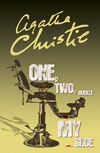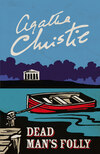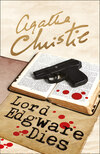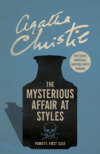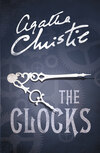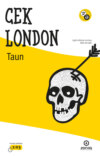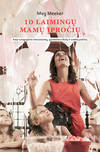Kitabı oku: «Murder on the Orient Express», sayfa 2
Chapter 3
Poirot Refuses a Case
M. Hercule Poirot was a little late in entering the luncheon-car on the following day. He had risen early, breakfasted almost alone, and had spent the morning going over the notes of the case that was recalling him to London. He had seen little of his travelling companion.
M. Bouc, who was already seated, gesticulated a greeting and summoned his friend to the empty place opposite him. Poirot sat down and soon found himself in the favoured position of the table which was served first and with the choicest morsels. The food, too, was unusually good.
It was not till they were eating a delicate cream cheese that M. Bouc allowed his attention to wander to matters other than nourishment. He was at the stage of a meal when one becomes philosophic.
‘Ah!’ he sighed. ‘If I had but the pen of a Balzac! I would depict this scene.’
He waved his hand.
‘It is an idea, that,’ said Poirot.
‘Ah, you agree? It has not been done, I think? And yet—it lends itself to romance, my friend. All around us are people, of all classes, of all nationalities, of all ages. For three days these people, these strangers to one another, are brought together. They sleep and eat under one roof, they cannot get away from each other. At the end of three days they part, they go their several ways, never, perhaps, to see each other again.’
‘And yet,’ said Poirot, ‘suppose an accident—’
‘Ah no, my friend—’
‘From your point of view it would be regrettable, I agree. But nevertheless let us just for one moment suppose it. Then, perhaps, all these here are linked together—by death.’
‘Some more wine,’ said M. Bouc, hastily pouring it out. ‘You are morbid, mon cher. It is, perhaps, the digestion.’
‘It is true,’ agreed Poirot, ‘that the food in Syria was not, perhaps, quite suited to my stomach.’
He sipped his wine. Then, leaning back, he ran his eye thoughtfully round the dining-car. There were thirteen people seated there and, as M. Bouc had said, of all classes and nationalities. He began to study them.
At the table opposite them were three men. They were, he guessed, single travellers graded and placed there by the unerring judgment of the restaurant attendants. A big, swarthy Italian was picking his teeth with gusto. Opposite him a spare, neat Englishman had the expressionless disapproving face of the well-trained servant. Next to the Englishman was a big American in a loud suit—possibly a commercial traveller.
‘You’ve got to put it over big,’ he was saying in a loud nasal voice.
The Italian removed his toothpick to gesticulate with it freely.
‘Sure,’ he said. ‘That whatta I say alla de time.’
The Englishman looked out of the window and coughed.
Poirot’s eye passed on.
At a small table, sitting very upright, was one of the ugliest old ladies he had ever seen. It was an ugliness of distinction—it fascinated rather than repelled. She sat very upright. Round her neck was a collar of very large pearls which, improbable though it seemed, were real. Her hands were covered with rings. Her sable coat was pushed back on her shoulders. A very small expensive black toque was hideously unbecoming to the yellow, toad-like face beneath it.
She was speaking now to the restaurant attendant in a clear, courteous but completely autocratic tone.
‘You will be sufficiently amiable to place in my compartment a bottle of mineral water and a large glass of orange juice. You will arrange that I shall have chicken cooked without sauces for dinner this evening—also some boiled fish.’
The attendant replied respectfully that it should be done.
She gave a slight gracious nod of the head and rose. Her glance caught Poirot’s and swept over him with the nonchalance of the uninterested aristocrat.
‘That is Princess Dragomiroff,’ said M. Bouc in a low tone. ‘She is a Russian. Her husband realized all this money before the Revolution and invested it abroad. She is extremely rich. A cosmopolitan.’
Poirot nodded. He had heard of Princess Dragomiroff.
‘She is a personality,’ said M. Bouc. ‘Ugly as sin, but she makes herself felt. You agree?’
Poirot agreed.
At another of the large tables Mary Debenham was sitting with two other women. One of them was a tall middle-aged woman in a plaid blouse and tweed skirt. She had a mass of faded yellow hair unbecomingly arranged in a large bun, wore glasses, and had a long, mild, amiable face rather like a sheep. She was listening to the third woman, a stout, pleasant-faced, elderly woman who was talking in a slow clear monotone which showed no signs of pausing for breath or coming to a stop.
‘…And so my daughter said, “Why,” she said “you just can’t apply Amurrican methods in this country. It’s just natural to the folks here to be indolent,” she said. “They just haven’t got any hustle in them.” But all the same you’d be surprised to know what our college there is doing. They’ve gotten a fine staff of teachers. I guess there’s nothing like education. We’ve got to apply our Western ideals and teach the East to recognize them. My daughter says—’
The train plunged into a tunnel. The calm monotonous voice was drowned.
At the next table, a small one, sat Colonel Arbuthnot—alone. His gaze was fixed upon the back of Mary Debenham’s head. They were not sitting together. Yet it could easily have been managed. Why?
Perhaps, Poirot thought, Mary Debenham had demurred. A governess learns to be careful. Appearances are important. A girl with her living to get has to be discreet.
His glance shifted to the other side of the carriage. At the far end, against the wall, was a middle-aged woman dressed in black with a broad expressionless face. German or Scandinavian, he thought. Probably a German lady’s-maid.
After her came a couple leaning forward and talking animatedly together. The man wore English clothes of loose tweed—but he was not English. Though only the back of his head was visible to Poirot, the shape of it and the set of the shoulders betrayed him. A big man, well made. He turned his head suddenly and Poirot saw his profile. A very handsome man of thirty odd with a big fair moustache.
The woman opposite him was a mere girl—twenty at a guess. A tight-fitting little black coat and skirt, white satin blouse, small chic black toque perched at the fashionable outrageous angle. She had a beautiful foreign-looking face, dead white skin, large brown eyes, jet-black hair. She was smoking a cigarette in a long holder. Her manicured hands had deep red nails. She wore one large emerald set in platinum. There was coquetry in her glance and voice.
‘Elle est jolie—et chic,’ murmured Poirot. ‘Husband and wife—eh?’
M. Bouc nodded.
‘Hungarian Embassy, I believe,’ he said. ‘A handsome couple.’
There were only two more lunchers—Poirot’s fellow traveller MacQueen and his employer Mr Ratchett. The latter sat facing Poirot, and for the second time Poirot studied that unprepossessing face, noting the false benevolence of the brow and the small, cruel eyes.
Doubtless M. Bouc saw a change in his friend’s expression.
‘It is at your wild animal you look?’ he asked.
Poirot nodded.
As his coffee was brought to him, M. Bouc rose to his feet. Having started before Poirot, he had finished some time ago.
‘I return to my compartment,’ he said. ‘Come along presently and converse with me.’
‘With pleasure.’
Poirot sipped his coffee and ordered a liqueur. The attendant was passing from table to table with his box of money, accepting payment for bills. The elderly American lady’s voice rose shrill and plaintive.
‘My daughter said, “Take a book of food tickets and you’ll have no trouble—no trouble at all.” Now, that isn’t so. Seems they have to have a ten per cent. tip, and then there’s that bottle of mineral water—and a queer sort of water too. They hadn’t got any Evian or Vichy, which seems queer to me.’
‘It is—they must—how you say—serve the water of the country,’ explained the sheep-faced lady.
‘Well, it seems queer to me.’ She looked distastefully at the heap of small change on the table in front of her. ‘Look at all this peculiar stuff he’s given me. Dinars or something. Just a lot of rubbish, it looks. My daughter said—’
Mary Debenham pushed back her chair and left with a slight bow to the other two. Colonel Arbuthnot got up and followed her. Gathering up her despised money, the American lady followed suit, followed by the lady like a sheep. The Hungarians had already departed. The restaurant-car was empty save for Poirot and Ratchett and MacQueen.
Ratchett spoke to his companion, who got up and left the car. Then he rose himself, but instead of following MacQueen he dropped unexpectedly into the seat opposite Poirot.
‘Can you oblige me with a light?’ he said. His voice was soft—faintly nasal. ‘My name is Ratchett.’
Poirot bowed slightly. He slipped his hand into his pocket and produced a matchbox which he handed to the other man, who took it but did not strike a light.
‘I think,’ he went on, ‘that I have the pleasure of speaking to M. Hercule Poirot. Is that so?’
Poirot bowed again.
‘You have been correctly informed, Monsieur.’
The detective was conscious of those strange shrewd eyes summing him up before the other spoke again.
‘In my country,’ he said, ‘we come to the point quickly. Mr Poirot, I want you to take on a job for me.’
Hercule Poirot’s eyebrows went up a trifle.
‘My clientèle, Monsieur, is limited nowadays. I undertake very few cases.’
‘Why, naturally, I understand that. But this, Mr Poirot, means big money.’ He repeated again in his soft, persuasive voice, ‘Big money.’
Hercule Poirot was silent a minute or two, then he said:
‘What is it you wish me to do for you, M.—er—Ratchett?’
‘Mr Poirot, I am a rich man—a very rich man. Men in that position have enemies. I have an enemy.’
‘Only one enemy?’
‘Just what do you mean by that question?’ asked Ratchett sharply.
‘Monsieur, in my experience when a man is in a position to have, as you say, enemies, then it does not usually resolve itself into one enemy only.’
Ratchett seemed relieved by Poirot’s answer. He said quickly:
‘Why, yes, I appreciate that point. Enemy or enemies—it doesn’t matter. What does matter is my safety.’
‘Safety?’
‘My life has been threatened, Mr Poirot. Now, I’m a man who can take pretty good care of himself.’ From the pocket of his coat his hand brought a small automatic into sight for a moment. He continued grimly. ‘I don’t think I’m the kind of man to be caught napping. But as I look at it I might as well make assurance doubly sure. I fancy you’re the man for my money, Mr Poirot. And remember—big money.’
Poirot looked at him thoughtfully for some minutes. His face was completely expressionless. The other could have had no clue as to what thoughts were passing in that mind.
‘I regret, Monsieur,’ he said at length. ‘I cannot oblige you.’
The other looked at him shrewdly.
‘Name your figure, then,’ he said.
Poirot shook his head.
‘You do not understand, Monsieur. I have been very fortunate in my profession. I have made enough money to satisfy both my needs and my caprices. I take now only such cases as—interest me.’
‘You’ve got a pretty good nerve,’ said Ratchett. ‘Will twenty thousand dollars tempt you?’
‘It will not.’
‘If you’re holding out for more, you won’t get it. I know what a thing’s worth to me.’
‘I also—M. Ratchett.’
‘What’s wrong with my proposition?’
Poirot rose.
‘If you will forgive me for being personal—I do not like your face, M. Ratchett,’ he said.
And with that he left the restaurant car.
Chapter 4
A Cry in the Night
The Simplon Orient Express arrived at Belgrade at a quarter to nine that evening. It was not due to depart again until 9.15, so Poirot descended to the platform. He did not, however, remain there long. The cold was bitter and though the platform itself was protected, heavy snow was falling outside. He returned to his compartment. The conductor, who was on the platform stamping his feet and waving his arms to keep warm, spoke to him.
‘Your valises have been moved, Monsieur, to the compartment No. 1, the compartment of M. Bouc.’
‘But where is M. Bouc, then?’
‘He has moved into the coach from Athens which has just been put on.’
Poirot went in search of his friend. M. Bouc waved his protestations aside.
‘It is nothing. It is nothing. It is more convenient like this. You are going through to England, so it is better that you should stay in the through coach to Calais. Me, I am very well here. It is most peaceful. This coach is empty save for myself and one little Greek doctor. Ah! my friend, what a night! They say there has not been so much snow for years. Let us hope we shall not be held up. I am not too happy about it, I can tell you.’
At 9.15 punctually the train pulled out of the station, and shortly afterwards Poirot got up, said good-night to his friend and made his way along the corridor back into his own coach which was in front next to the dining-car.
On this, the second day of the journey, barriers were breaking down. Colonel Arbuthnot was standing at the door of his compartment talking to MacQueen.
MacQueen broke off something he was saying when he saw Poirot. He looked very surprised.
‘Why,’ he cried, ‘I thought you’d left us. You said you were getting off at Belgrade.’
‘You misunderstood me,’ said Poirot, smiling. ‘I remember now, the train started from Stamboul just as we were talking about it.’
‘But, man, your baggage—it’s gone.’
‘It has been moved into another compartment—that is all.’
‘Oh, I see.’
He resumed his conversation with Arbuthnot and Poirot passed on down the corridor.
Two doors from his own compartment, the elderly American lady, Mrs Hubbard, was standing talking to the sheep-like lady who was a Swede. Mrs Hubbard was pressing a magazine on the other.
‘No, do take it, my dear,’ she said. ‘I’ve got plenty other things to read. My, isn’t the cold something frightful?’ She nodded amicably to Poirot.
‘You are most kind,’ said the Swedish lady.
‘Not at all. I hope you’ll sleep well and that your head will be better in the morning.’
‘It is the cold only. I make now myself a cup of tea.’
‘Have you got some aspirin? Are you sure, now? I’ve got plenty. Well, good-night, my dear.’
She turned to Poirot conversationally as the other woman departed.
‘Poor creature, she’s a Swede. As far as I can make out, she’s a kind of missionary—a teaching one. A nice creature, but doesn’t talk much English. She was most interested in what I told her about my daughter.’
Poirot, by now, knew all about Mrs Hubbard’s daughter. Everyone on the train who could understand English did! How she and her husband were on the staff of a big American college in Smyrna and how this was Mrs Hubbard’s first journey to the East, and what she thought of the Turks and their slipshod ways and the condition of their roads.
The door next to them opened and the thin, pale manservant stepped out. Inside Poirot caught a glimpse of Mr Ratchett sitting up in bed. He saw Poirot and his face changed, darkening with anger. Then the door was shut.
Mrs Hubbard drew Poirot a little aside.
‘You know, I’m dead scared of that man. Oh, not the valet—the other—his master. Master, indeed! There’s something wrong about that man. My daughter always says I’m very intuitive. “When Momma gets a hunch, she’s dead right,” that’s what my daughter says. And I’ve got a hunch about that man. He’s next door to me, and I don’t like it. I put my grips against the communicating door last night. I thought I heard him trying the handle. Do you know, I shouldn’t be surprised if that man turns out to be a murderer—one of these train robbers you read about. I dare say I’m foolish, but there it is. I’m downright scared of the man! My daughter said I’d have an easy journey, but somehow I don’t feel happy about it. It may be foolish, but I feel anything might happen. Anything at all. And how that nice young fellow can bear to be his secretary I can’t think.’
Colonel Arbuthnot and MacQueen were coming towards them down the corridor.
‘Come into my carriage,’ MacQueen was saying. ‘It isn’t made up for the night yet. Now what I want to get right about your policy in India is this—’
The men passed and went on down the corridor to MacQueen’s carriage.
Mrs Hubbard said good-night to Poirot.
‘I guess I’ll go right to bed and read,’ she said. ‘Good-night.’
‘Good-night, Madame.’
Poirot passed into his own compartment, which was the next one beyond Ratchett’s. He undressed and got into bed, read for about half an hour and then turned out the light.
He awoke some hours later, and awoke with a start. He knew what it was that had wakened him—a loud groan, almost a cry, somewhere close at hand. At the same moment the ting of a bell sounded sharply.
Poirot sat up and switched on the light. He noticed that the train was at a standstill—presumably at a station.
That cry had startled him. He remembered that it was Ratchett who had the next compartment. He got out of bed and opened the door just as the Wagon Lit conductor came hurrying along the corridor and knocked on Ratchett’s door. Poirot kept his door open a crack and watched. The conductor tapped a second time. A bell rang and a light showed over another door farther down. The conductor glanced over his shoulder.
At the same moment a voice from within the next-door compartment called out:
‘Ce n’est rien. Je me suis trompé.’
‘Bien, Monsieur.’ The conductor scurried off again, to knock at the door where the light was showing.
Poirot returned to bed, his mind relieved, and switched off the light. He glanced at his watch. It was just twenty-three minutes to one.
Chapter 5
The Crime
He found it difficult to go to sleep again at once. For one thing, he missed the motion of the train. If it was a station outside it was curiously quiet. By contrast, the noises on the train seemed unusually loud. He could hear Ratchett moving about next door—a click as he pulled down the washbasin, the sound of the tap running, a splashing noise, then another click as the basin shut to again. Footsteps passed up the corridor outside, the shuffling footsteps of someone in bedroom slippers.
Hercule Poirot lay awake staring at the ceiling. Why was the station outside so silent? His throat felt dry. He had forgotten to ask for his usual bottle of mineral water. He looked at his watch again. Just after a quarter-past one. He would ring for the conductor and ask him for some mineral water. His finger went out to the bell, but he paused as in the stillness he heard a ting. The man couldn’t answer every bell at once.
Ting…ting…ting…
It sounded again and again. Where was the man? Somebody was getting impatient.
Ting…
Whoever it was was keeping their finger solidly on the push.
Suddenly with a rush, his footsteps echoing up the aisle, the man came. He knocked at a door not far from Poirot’s own.
Then came voices—the conductor’s, deferential, apologetic, and a woman’s—insistent and voluble.
Mrs Hubbard.
Poirot smiled to himself.
The altercation—if it was one—went on for some time. Its proportions were ninety per cent. of Mrs Hubbard’s to a soothing ten per cent. of the conductor’s. Finally the matter seemed to be adjusted. Poirot heard distinctly:
‘Bonne nuit, Madame,’ and a closing door.
He pressed his own finger on the bell.
The conductor arrived promptly. He looked hot and worried.
‘De l’eau minerale, s’il vous plait.’
‘Bien, Monsieur.’ Perhaps a twinkle in Poirot’s eye led him to unburden himself.
‘La Dame Americaine—’
‘Yes?’
He wiped his forehead.
‘Imagine to yourself the time I have had with her! She insists—but insists—that there is a man in her compartment! Figure to yourself, Monsieur. In a space of this size.’ He swept a hand round. ‘Where would he conceal himself? I argue with her. I point out that it is impossible. She insists. She woke up and there was a man there. And how, I ask, did he get out and leave the door bolted behind him? But she will not listen to reason. As though, there were not enough to worry us already. This snow—’
‘Snow?’
‘But yes, Monsieur. Monsieur has not noticed? The train has stopped. We have run into a snowdrift. Heaven knows how long we shall be here. I remember once being snowed up for seven days.’
‘Where are we?’
‘Between Vincovi and Brod.’
‘Làlà,’ said Poirot vexedly.
The man withdrew and returned with the water.
‘Bon soir, Monsieur.’
Poirot drank a glass of water and composed himself to sleep.
He was just dropping off when something again woke him. This time it was as though something heavy had fallen with a thud against the door.
He sprang up, opened it and looked out. Nothing. But to his right some way down the corridor a woman wrapped in a scarlet kimono was retreating from him. At the other end, sitting on his little seat, the conductor was entering up figures on large sheets of paper. Everything was deathly quiet.
‘Decidedly I suffer from the nerves,’ said Poirot and retired to bed again. This time he slept till morning.
When he awoke the train was still at a standstill. He raised a blind and looked out. Heavy banks of snow surrounded the train.
He glanced at his watch and saw that it was past nine o’clock.
At a quarter to ten, neat, spruce, and dandified as ever, he made his way to the restaurant-car, where a chorus of woe was going on.
Any barriers there might have been between the passengers had now quite broken down. All were united by a common misfortune. Mrs Hubbard was loudest in her lamentations.
‘My daughter said it would be the easiest way in the world. Just sit in the train until I got to Parrus. And now we may be here for days and days,’ she wailed. ‘And my boat sails the day after tomorrow. How am I going to catch it now? Why, I can’t even wire to cancel my passage. I feel too mad to talk about it.’
The Italian said that he had urgent business himself in Milan. The large American said that that was ‘too bad, Ma’am,’ and soothingly expressed a hope that the train might make up time.
‘My sister—her children wait me,’ said the Swedish lady and wept. ‘I get no word to them. What they think? They will say bad things have happen to me.’
‘How long shall we be here?’ demanded Mary Debenham. ‘Doesn’t anybody know?’
Her voice sounded impatient, but Poirot noted that there were no signs of that almost feverish anxiety which she had displayed during the check to the Taurus Express.
Mrs Hubbard was off again.
‘There isn’t anybody knows a thing on this train. And nobody’s trying to do anything. Just a pack of useless foreigners. Why, if this were at home, there’d be someone at least trying to do something.’
Arbuthnot turned to Poirot and spoke in careful British French.
‘Vous êtes un directeur de la ligne, je crois, Monsieur. Vous pouvez nous dire—’
Smiling Poirot corrected him.
‘No, no,’ he said in English. ‘It is not I. You confound me with my friend M. Bouc.’
‘Oh! I’m sorry.’
‘Not at all. It is most natural. I am now in the compartment that he had formerly.’
M. Bouc was not present in the restaurant-car. Poirot looked about to notice who else was absent.
Princess Dragomiroff was missing and the Hungarian couple. Also Ratchett, his valet, and the German lady’s-maid.
The Swedish lady wiped her eyes.
‘I am foolish,’ she said. ‘I am baby to cry. All for the best, whatever happen.’
This Christian spirit, however, was far from being shared.
‘That’s all very well,’ said MacQueen restlessly. ‘We may be here for days.’
‘What is this country anyway?’ demanded Mrs Hubbard tearfully.
On being told it was Yugo-Slavia she said:
‘Oh! one of these Balkan things. What can you expect?’
‘You are the only patient one, Mademoiselle,’ said Poirot to Miss Debenham.
She shrugged her shoulders slightly.
‘What can one do?’
‘You are a philosopher, Mademoiselle.’
‘That implies a detached attitude. I think my attitude is more selfish. I have learned to save myself useless emotion.’
She was not even looking at him. Her gaze went past him, out of the window to where the snow lay in heavy masses.
‘You are a strong character, Mademoiselle,’ said Poirot gently. ‘You are, I think, the strongest character amongst us.’
‘Oh, no. No, indeed. I know one far far stronger than I am.’
‘And that is—?’
She seemed suddenly to come to herself, to realize that she was talking to a stranger and a foreigner with whom, until this morning, she had only exchanged half a dozen sentences.
She laughed a polite but estranging laugh.
‘Well—that old lady, for instance. You have probably noticed her. A very ugly old lady, but rather fascinating. She has only to lift a little finger and ask for something in a polite voice—and the whole train runs.’
‘It runs also for my friend M. Bouc,’ said Poirot. ‘But that is because he is a director of the line, not because he has a masterful character.’
Mary Debenham smiled.
The morning wore away. Several people, Poirot amongst them, remained in the dining-car. The communal life was felt, at the moment, to pass the time better. He heard a good deal more about Mrs Hubbard’s daughter and he heard the lifelong habits of Mr Hubbard, deceased, from his rising in the morning and commencing breakfast with a cereal to his final rest at night in the bed-socks that Mrs Hubbard herself had been in the habit of knitting for him.
It was when he was listening to a confused account of the missionary aims of the Swedish lady that one of the Wagon Lit conductors came into the car and stood at his elbow.
‘Pardon, Monsieur.’
‘Yes?’
‘The compliments of M. Bouc, and he would be glad if you would be so kind as to come to him for a few minutes.’
Poirot rose, uttered excuses to the Swedish lady and followed the man out of the dining-car.
It was not his own conductor, but a big fair man.
He followed his guide down the corridor of his own carriage and along the corridor of the next one. The man tapped at a door, then stood aside to let Poirot enter.
The compartment was not M. Bouc’s own. It was a second-class one—chosen presumably because of its slightly larger size. It certainly gave the impression of being crowded.
M. Bouc himself was sitting on the small seat in the opposite corner. In the corner next the window facing him was a small, dark man looking out at the snow. Standing up and quite preventing Poirot from advancing any farther was a big man in blue uniform (the chef de train) and his own Wagon Lit conductor.
‘Ah, my good friend,’ cried M. Bouc. ‘Come in. We have need of you.’
The little man in the window shifted along the seat, Poirot squeezed past the other two men and sat down facing his friend.
The expression on M. Bouc’s face gave him, as he would have expressed it, furiously to think. It was clear that something out of the common had happened.
‘What has occurred?’ he asked.
‘You may well ask that. First this snow—this stoppage. And now—’
He paused—and a sort of strangled gasp came from the Wagon Lit conductor.
‘And now what?’
‘And now a passenger lies dead in his berth—stabbed.’
M. Bouc spoke with a kind of calm desperation.
‘A passenger? Which passenger?’
‘An American. A man called—called—’ he consulted some notes in front of him. ‘Ratchett—that is right—Ratchett?’
‘Yes, Monsieur,’ the Wagon Lit man gulped.
Poirot looked at him. He was as white as chalk.
‘You had better let that man sit down,’ he said. ‘He may faint otherwise.’
The chef de train moved slightly and the Wagon Lit man sank down in the corner and buried his face in his hands.
‘Brr!’ said Poirot. ‘This is serious!’
‘Certainly it is serious. To begin with, a murder—that by itself is a calamity of the first water. But not only that, the circumstances are unusual. Here we are, brought to a standstill. We may be here for hours—and not only hours—days! Another circumstance. Passing through most countries we have the police of that country on the train. But in Yugoslavia—no. You comprehend?’
‘It is a position of great difficulty,’ said Poirot.
‘There is worse to come. Dr Constantine—I forgot, I have not introduced you—Dr Constantine, M. Poirot.’
The little dark man bowed and Poirot returned it.
‘Dr Constantine is of the opinion that death occurred at about 1 a.m.’
‘It is difficult to say exactly in these matters,’ said the doctor, ‘but I think I can say definitely that death occurred between midnight and two in the morning.’
‘When was this M. Ratchett last seen alive?’ asked Poirot.
‘He is known to have been alive at about twenty minutes to one, when he spoke to the conductor,’ said M. Bouc.
‘That is quite correct,’ said Poirot. ‘I myself heard what passed. That is the last thing known?’
‘Yes.’
Poirot turned toward the doctor, who continued?
‘The window of M. Ratchett’s compartment was found wide open, leading one to suppose that the murderer escaped that way. But in my opinion that open window is a blind. Anyone departing that way would have left distinct traces in the snow. There were none.’
‘The crime was discovered—when?’ asked Poirot.
‘Michel!’
The Wagon Lit conductor sat up. His face still looked pale and frightened.
‘Tell this gentleman exactly what occurred,’ ordered M. Bouc.

